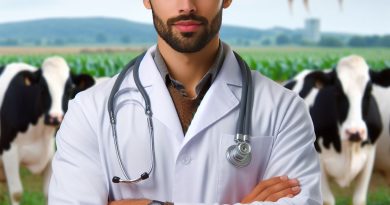Tax Planning for Livestock Producers
Last Updated on March 1, 2024
Introduction
Tax planning for livestock producers is essential, as it helps minimize taxes and maximize profits.
Importance of tax planning for livestock producers
By strategically managing tax obligations, producers can minimize liabilities, maximize deductions, and improve cash flow.
Understanding tax laws related to livestock farming allows for effective planning of expenses, investments, and income reporting.
Through proactive tax planning, producers can enhance their financial stability, mitigate risks, and maintain competitiveness in the dynamic agricultural market.
Purpose of the blog post
This blog post aims to provide valuable insights and strategies for effective tax planning.
Understanding the Tax Environment for Livestock Producers
As a livestock producer, it is important to have a clear understanding of the current tax laws and regulations that apply to your business.
This knowledge will help you navigate the tax environment and make informed decisions that can optimize your tax planning.
Here’s an overview of the key tax considerations specific to livestock producers:
Overview of the current tax laws and regulations:
- IRS regulations govern the tax treatment of income generated from the sale of livestock.
- Livestock producers must report their income and expenses accurately on their annual tax returns.
- Tax deductions and credits can be utilized to reduce the overall tax liability for livestock producers.
- Livestock producers may need to comply with additional tax requirements at the state and local levels.
Key tax considerations specific to livestock producers:
- Depreciation: Livestock producers can depreciate the cost of qualified property, such as breeding livestock, over a specific period.
- Capital gains: Selling breeding livestock or other assets at a profit can result in capital gains tax obligations.
- Inventory valuation: Livestock producers can choose between different methods, such as accrual or cash accounting, to value their inventory for tax purposes.
- Section 179 deduction: Livestock producers can take advantage of the Section 179 deduction to immediately expense the cost of certain qualifying property, such as machinery or equipment.
- Net operating losses: If a livestock producer incurs a loss, it may be possible to carry it forward or back to offset taxable income in other years.
- Qualified business income deduction: Livestock producers operating as pass-through entities may be eligible for a deduction based on their qualified business income.
- Pension and retirement plans: Livestock producers can establish pension plans or retirement accounts that offer tax advantages for themselves and their employees.
- Self-employment tax: Livestock producers who operate as sole proprietors are subject to self-employment tax, which covers Medicare and Social Security contributions.
Understanding these key tax considerations allows livestock producers to develop effective tax planning strategies.
By taking advantage of tax deductions, depreciation, and other applicable tax provisions, livestock producers can minimize their tax liability and improve their overall financial position.
It is important to consult with a qualified tax professional or accountant who specializes in agriculture to ensure compliance with the complex tax laws and regulations applicable to livestock producers.
In essence, being well-informed about the tax environment for livestock producers is crucial for effective tax planning.
By understanding the current tax laws and regulations and considering the specific tax considerations relevant to their industry, livestock producers can make informed decisions and optimize their tax strategies.
Remember to consult with a tax professional to ensure compliance and maximize the tax benefits available to your livestock production business.
Read: Federal Land Use: New Farming Rules
Tax Planning Strategies for Livestock Producers
Tax planning is crucial for livestock producers as it allows them to optimize their financial management and minimize tax liability.
By implementing strategic approaches to income management and reporting, producers can effectively differentiate between ordinary income and capital gains.
This awareness enables them to take advantage of tax benefits specific to each type of income.
Income Management and Reporting
Timing strategies are another essential aspect of tax planning for livestock producers.
By carefully planning when to recognize income, producers can align their financial activities to minimize tax liability.
For example, they can defer income recognition to a future tax year with lower rates or accelerate income recognition to utilize expiring tax credits effectively.
Livestock sales and breeding activities contribute significantly to producers’ income.
Proper management of these income sources is crucial for tax planning.
Producers need to keep detailed records of their transactions and related expenses and maximize deductions for these activities.
By doing so, they can minimize their taxable income and consequently reduce their tax liability.
Deductions and Tax Credits
Identifying deductible expenses specific to livestock production is vital for tax planning purposes.
These expenses may include feed, veterinary services, breeding fees, transportation costs, and insurance premiums.
Properly identifying and deducting these expenses can significantly reduce taxable income for livestock producers.
Livestock and equipment depreciation rules offer additional tax-saving opportunities.
Producers need to understand these rules to accurately depreciate their assets and claim applicable deductions.
By carefully managing depreciation, producers can reduce their taxable income and ultimately lower their tax burden.
Furthermore, livestock producers should take advantage of tax credits available to them.
Tax credits specifically designed for livestock producers provide further opportunities to reduce their tax liability.
By understanding and utilizing these credits effectively, producers can maximize their tax savings.
Entity Structure Selection
Choosing the most suitable entity structure is another significant aspect of tax planning for livestock producers.
Sole proprietorships, partnerships, LLCs, and corporations each have different tax implications and benefits.
Producers need to evaluate these options based on their individual circumstances and tax planning goals to optimize their overall tax position.
Retirement and Succession Planning
In retirement and succession planning, livestock producers should consider the importance of securing financial stability for their future.
Implementing tax-efficient strategies for transferring ownership or transitioning the business to the next generation is crucial.
This ensures smooth succession and minimizes tax consequences during the transition.
In general, tax planning strategies play a vital role in ensuring the financial success of livestock producers.
By effectively managing income, identifying deductible expenses, utilizing tax credits, selecting the optimal entity structure, and planning for retirement and succession, producers can maximize their tax benefits and reduce their tax liability.
This proactive approach to tax planning allows livestock producers to optimize their financial position and ensure long-term profitability.
Read: Maximizing Credits in Agricultural Taxation
Working with Tax Professionals
Benefits of working with a tax professional familiar with livestock production
Working with a tax professional familiar with livestock production brings numerous benefits.
- Expertise: A tax professional with knowledge of livestock production understands the complexities involved in this industry.
- Deduction Maximization: They can help maximize deductions specific to livestock producers, ensuring you don’t miss out on potential savings.
- Compliance: By working with a tax professional, you can remain compliant with ever-changing tax laws and regulations.
- Audit Assistance: If you face an audit, a qualified tax advisor can provide valuable guidance and support.
- Efficient Record-Keeping: A tax professional can help you establish efficient record-keeping systems to maintain accurate financial information.
Tips for finding and selecting a qualified tax advisor
When looking for a tax advisor, consider the following tips:
- Specialization: Look for professionals who specialize or have experience working with agricultural businesses and livestock production.
- Credentials: Ensure the tax advisor is qualified and possesses appropriate certifications, such as a Certified Public Accountant (CPA) designation.
- References: Ask for references from other livestock producers who have utilized their services.
- Proactive Approach: Seek a tax professional who takes a proactive approach in identifying potential tax planning opportunities.
- Communication: Select someone who effectively communicates complex tax concepts and strategies in a clear and understandable manner.
Collaborating with the tax professional to develop a comprehensive tax plan
Once you’ve found a tax professional, collaboration is crucial in developing a comprehensive tax plan:
- Provide Information: Furnish the tax professional with all relevant financial and livestock-related information, including income, expenses, and herd size.
- Goals and Objectives: Clearly communicate your long-term goals and objectives, as this will enable the tax professional to tailor the plan accordingly.
- Discuss Timing: Together with the tax professional, determine the timing of income and expenses to ensure favorable tax consequences.
- Regular Meetings: Maintain regular communication with the tax professional throughout the year to address any changes or new opportunities that arise.
- Plan Review: Regularly review and update the tax plan to adapt to changing circumstances or modifications in tax laws.
Remember, working with a tax professional is an investment that can save you money and help you navigate the complexities of tax planning for livestock production.
Read: Federal Land Use: New Farming Rules

Additional Considerations and Best Practices
Successful tax planning for livestock producers requires attention to additional considerations and implementation of best practices.
By prioritizing accurate record-keeping, staying informed about tax law changes, and adopting long-term strategies, producers can maximize their tax benefits and minimize liabilities.
Keeping accurate records and maintaining good bookkeeping practices
Accurate record-keeping is crucial for livestock producers to substantiate their taxable income and deductions.
Consistent and meticulous documentation of expenses, income, inventory, and sales is essential.
Moreover, producers should maintain separate financial accounts for their business and personal use.
This separation helps prevent intermingling of funds, which could lead to confusion during tax preparation and potential audit issues.
Utilizing reliable bookkeeping practices, such as regularly reconciling financial statements and promptly inputting data, ensures that records are up-to-date and accurate.
Following a standardized chart of accounts and organizing receipts and invoices by category simplifies the tax preparation process.
Staying updated on changes to tax laws that may impact livestock producers
Tax laws are subject to frequent changes, making it critical for livestock producers to stay informed and adapt their tax planning accordingly.
Producers should keep track of updates from the Internal Revenue Service (IRS), state tax agencies, and industry-specific organizations.
New tax laws or regulations may influence deductions, credits, depreciation rules, or other tax-related aspects of livestock farming.
Being unaware of these changes could result in missed opportunities to reduce tax liabilities or compliance errors that may lead to penalties.
Engaging with tax professionals who specialize in agricultural taxation can provide valuable guidance on current tax laws and their impact on livestock producers.
These experts understand the nuances of the industry and can help develop effective tax strategies.
Considering long-term tax planning strategies beyond the current year
While ensuring tax compliance for the current year is essential, livestock producers should also focus on long-term tax planning to maximize tax benefits over time.
Proactive tax planning can create opportunities for strategic decisions that minimize tax liabilities and optimize financial outcomes.
One effective strategy that producers may consider is managing income fluctuations by utilizing income averaging, where income is spread over multiple tax years to reduce the overall tax burden.
This approach can help offset higher-income years and align tax liabilities with cash flow.
Additionally, evaluating the use of tax-advantaged retirement plans, such as individual retirement accounts (IRAs) or self-employed pension plans (SEPs), can provide long-term tax advantages.
These plans allow for tax-deductible contributions, tax-deferred growth, and potentially lower tax rates upon withdrawal.
Collaborating with tax advisors who specialize in agricultural taxation is crucial for developing personalized long-term tax plans.
These professionals can assess individual circumstances, goals, and available tax strategies to create a comprehensive plan tailored to each producer’s specific needs.
In summary, livestock producers can enhance their tax planning efforts by keeping accurate records, staying updated on tax law changes, and considering long-term strategies.
Implementing these additional considerations and best practices will help maximize tax benefits, ensure compliance, and ultimately contribute to the financial success of livestock farming operations.
Read: Navigating Farm Subsidies: A 2024 Guide
Discover More: Navigating Livestock Import Rules
Conclusion
Recap of important points discussed
Tax planning is crucial for livestock producers to maximize their financial benefits.
Throughout this blog post, we have highlighted several important points:
- The significant tax implications associated with livestock production.
- The various strategies and deductions available to minimize tax burdens.
- The importance of record-keeping and accurate financial reporting.
Encouragement to prioritize tax planning for livestock producers
It is essential for livestock producers to prioritize tax planning in order to:
- Reduce tax liabilities and maximize profits.
- Ensure compliance with tax laws and regulations.
- Take advantage of available tax incentives and deductions.
Invitation for readers to reach out for further assistance or consultation
If you have any questions or need further assistance regarding tax planning for livestock producers, please do not hesitate to reach out.
Our team of experts is ready to provide guidance and support.
Remember, proactive tax planning can make a significant difference in your financial success as a livestock producer. Start planning today!


